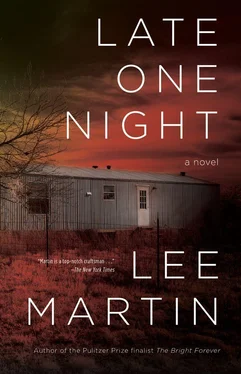Lee Martin
Late One Night
Silently, one by one, in the infinite meadows of heaven,
Blossomed the lovely stars, the forget-me-nots of the angels.
— Henry Wadsworth Longfellow
Ronnie swore it was talk and nothing more. Jesus. Just the hasty words of folks eager to blame someone. They’d wanted answers ever since the news first broke and then traveled across the southern part of Illinois and as far north as Chicago, where the AP wire service picked it up and sent it all over the country. News from a house trailer along a blacktop road ten miles east of Goldengate in the dark of a winter’s night. News the like you’d never want to hear if you could help it.
“You really think I could do something like that?” Ronnie said to the sheriff, Ray Biggs. “You think I’m that kind?”
Biggs was a tall man with dark hair that came to a widow’s peak. He squinted his eyes, the worry crease above the bridge of his nose furrowing into his brow. “Motive and opportunity.” He slapped his hand down on the table twice, the heavy gold band of his Masonic ring making a sharp clacking noise. “Doesn’t take a blind man to see you had both.”
Ronnie watched out the window as snow fell on the courthouse lawn. Half rain, with just enough snow mixed in to add to the cover already on the ground. Through the bare limbs of the giant oaks, he looked down onto State Street. Lights were on in the windows of the J.C. Penney store, and the Mi Casita Mexican restaurant, and the Reasoner Insurance Agency. A man came out of Penney’s, a blue scarf wrapped around his face, his shoulders hunched up against the frigid air. He leaned into the wind as he hurried down the sidewalk. Ronnie wished he could be that man, making his way through the cold, making his way home to his family.
“You better start talking.” Biggs leaned back in his chair. “You better tell me something I’ll believe.”
“So it’s a story you want?” Ronnie kept staring out the window, thinking how pretty that snow was on the grass and the boughs of the evergreen trees on the courthouse lawn.
“A true story,” Biggs said. “A story so real it’ll save you. A story as real as that.”
Della and the kids — the oldest fourteen, the youngest still a baby — lived in a trailer just south of the Bethlehem corner. Lived there by themselves because late in September, Ronnie moved out and took up living in town with his girlfriend, Brandi Tate. For a while, it was the talk all around Goldengate and out the blacktop to the farms and the shotgun houses and the trailer homes. All that autumn and up through Thanksgiving, folks spoke of it at Read’s IGA, Inyart’s Sundries, Johnstone’s Hardware, the First National Bank, the Real McCoy Café: Ronnie Black had walked out on Della and all those kids.
It was ten thirty on a bitterly cold night in January when Missy Wade, Della’s neighbor, looked out her bedroom window and could hardly believe what she saw.
The trailer was on fire.
Missy and her husband, Pat, lived a hundred yards to the west of Della, a barren cornfield between them. It was mostly open land out there. The flat fields stretched back to thin bands of woodland. That night, there was snow cover on the fields and the temperature had gone down below zero. Across the road from Della’s, a pole light lit up Shooter Rowe’s barnyard and the square, low-roofed ranch house where he lived with his son. Missy saw them running toward the trailer: Shooter and Wesley, the simpleminded boy everyone called Captain.
Pat was already asleep, and Missy shook him hard. The phone was in her hand, and she was calling 911.
“Wake up,” she said. “Pat, wake up. Della’s trailer’s on fire.”
Pat was up in a snap, throwing on the Carhartt overalls he’d left draped over a chair, pushing his feet into boots, grabbing a coat, and then running out into the cold night, running up the blacktop, his heart beating hard, the frigid air stinging his nostrils and pushing an ache into his throat and chest.
Shooter was already at the trailer. The front door stood open, and his bulk nearly filled it, his broad back and shoulders, his height, the mane of his long silver hair. When Pat got there, he saw that Della was handing out one of the twins. The little girl was in a white sleep shirt, and Shooter held her and turned to Pat with the most helpless look on his face, as if he wasn’t sure what to do with this bare-legged, barefoot girl.
Captain stepped up. He was nearly as tall as his father, a sixteenyear-old boy whose body was growing into manhood. Without a word, he took the girl from Shooter and handed her to the oldest girl, Angel, who was in sweatpants and a T-shirt. Hannah, the next in line, was there too, a wild look in her eyes, her face red from the heat of the fire.
Pat counted in his head — three kids safe and four more still inside.
The air stank of burning plastic and fiberglass insulation and melting vinyl. It all popped and crackled. The roof was starting to go.
“Oh, good Lord,” Shooter said.
He started to go into the trailer, but then Della was back. This time she had Sarah, the one born a few years after Hannah. Della handed Sarah out to Shooter, and he gave her to Pat. She clung to his neck, and he could smell the smoke on her, could feel the heat from her body.
Off in the distance, the sirens from the first fire trucks grew louder.
“You better get out of there,” Shooter yelled.
Della shook her head. “I’m going back for Emily.” So the first twin had been Emma. Pat would tell Missy later that Della was calm. She wasn’t panicked at all. “I’m going to get Emily and Gracie and Junior,” she said. “I’m going to get them all out.”
Earlier that evening she’d scooped the hot ashes from the Franklin stove into a cardboard box. She was burning wood in the stove because the wall furnace had been cutting out. She couldn’t have that, not with the baby, Junior, sick with the croup.
Her parents dropped by around suppertime, carrying in hot dogs and buns and bags of potato chips, and after they ate, her father, Wayne, gave the furnace a check. Slowed by age, he still did a few home repairs and small jobs here and there, but nothing to count for anything. Wayne Best used to be able to go longer than the day itself, folks said, but now he had tremors in his fingers and sometimes dizzy spells that knocked him flat. He was a lean man who kept his white hair cut in a flattop. He had a white moustache that his wife, Lois, kept neatly trimmed.
“Your pilot light’s out,” he told Della.
He relit it, the match flame wavering in his unsteady hand, and after a while he said everything seemed to be working fine.
“Maybe you should gather up the kids and come spend the night at our place,” Lois said. “Just to be on the safe side. Weather on the radio said we might get down to ten below.”
“Daddy’s got the furnace running.” Della was too tired to think about all it would take to get the kids bundled up, and pajamas and things gathered, and then over to her parents’ house. “I’ll keep the Franklin stove burning just in case.”
Wayne helped Lois on with her coat. She was a heavy woman with a knee that needed to be replaced. A round-faced woman with deep lines around her eyes and on her forehead from her tendency to worry things to death. She took Wayne’s arm and they started for the door.
“Better pull your car into the garage.” Wayne opened the door and the cold air came rushing in around Della’s legs. “Save your battery.”
Читать дальше












